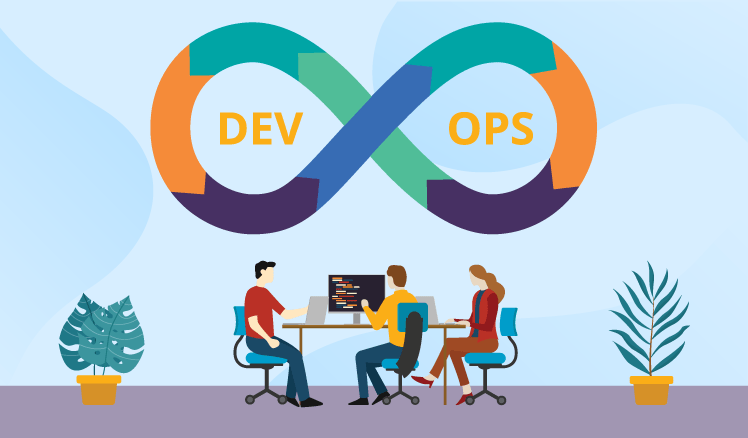
In 2009, for the first time, we had heard the term „DevOps”. So it is not a novelty, right? But still, we could often encounter an organisational culture model where the Developers team and IT operations working separately. Lack of communication, not understanding the difficulties of dealing is a straight line to misunderstandings and delays. So are you still hesitating if you need DevOps in your team? We create this article to resolve any doubts which could come across to your mind.
First things first – what is DevOps?
DevOps is a fusion of words development and operations. But this is something more than simply taking these terms together. The primary purpose is to accelerate creating and developing the product by blurring the barriers between areas in the company and working as one team, not separate individuals. Now, when client requirements and creating solutions are highly complex, one specialist cannot manage the whole project independently. Dim and distant past when developers had time to deployment besides software delivery is irretrievably gone. So, what is the difference?
- Cooperation and adjustment – teams share their processes, challenges, and priorities to jointly planning the work and aims.
- Apportion of responsibility – people’s commitment to the project starts to engage in parts not strictly connected with their role.
- A shorter release cycle – equals a positive impact on managing risk, quicker adjustment, and reaction for client needs and market changes.
- Gaining knowledge attitude – immediate, reacting to mistakes and taking lessons from them to incorporate improvements and make clients satisfied and innovative.
These points could be sum up into four letters: CI and CD. Do these abbreviations sound like no clue? Continuous Integration and Continuous Development are opposed to waterfall methodologies – instead of linear timeline and working on stages step-by-step, infinite feedback loop and simultaneously open stages.
What DevOps engineer brings on to your company?
Their responsibilities could be wide-ranging, so take a look at some of them:
- Managing the project: so watching over if the team is aware of principal deadlines and objectives. It is also monitoring and providing feedback.
- Optimising: DevOps removes time drains and could propose new solutions for new ways to optimise the release cycle.
- Did the team slow down by spending hours on a repetitive task? DevOps might bring in some automation to set free the coworkers and focus on a different stage.
- Benchmarking: evaluating and testing an emerging product is the core of DevOps’ responsibilities.
That’s why this kind of IT professional working with software development, system operators, and admins is often comparing to the bridge connecting the whole team.
Moreover, the worth of mention is that DevOps engineers haven’t always been one. A team of DevOps engineers could be a support to a project and taking care of specific tasks.What skills should have a good DevOps engineer?
You could start wondering if a DevOps engineer has to know how to code? The simplest answer is no, but let’s get some explanation.
DevOps engineers don’t work on the product as itself (so on the code), but they should have some knowledge of scripting. It helps with similar developers’ way of thinking – that means better communication. It also enables using tools like Ansible or Terraform, which could be indispensable while launching some projects. But the capability to test software is critical. Of course, it could be automated, but still, not everything and the ability to do a manual test could be crucial when the project be in a tight corner.
Being familiar with Agile – as was mentioned before, DevOps based on iterations and short feedback loop. So it’s good to have someone who knows and understands this methodology.
Containers are still a novelty, but DevOps engineer who has knowledge how to use tools like Docker, Jenkins or Gitlab can boost the CI process.
„Soft” skills are as important as technical ones. DevOps engineer will be responsible for running meetings, leading, and setting releases schedule. This person has to improve communication inside the team, not to constrict it. Making the decision for others and not trying to understand team workers creates barriers instead of knocking them down. More barriers equal worse communication and, in the end, probably lower the quality of your product and the level of satisfaction of your client.
DevOps and The Cloud – what they have in common?
Cloud Service Models are a hot topic today and the norm in the future of small businesses and global enterprises. But are you wondering why we put DevOps and the cloud in one sentence? These seemingly unrelated terms have a lot in common. But first, a pinch of theory.
Cloud services are services delivered over the Internet, so without necessary internal infrastructure or hardware. There is a wide range of cloud services, but let’s behold on two of them.
PaaS (Platform as a Service) is a cloud-based complete platform to use. What does it mean that it’s complete? The provider takes care of parts like network access, hosting, security, servers, and storage to give space for developing and testing apps.
Iaas (Infrastructure as a Service) means easy access to cloud-based web apps with no need for installation or download in the existing computing structure.
The cloud simplifies and accelerates the development process and provides DevOps with a centralised platform for production, testing, and deploying a product. Without the cloud, distribution complex software is almost infeasible. Moreover, most cloud computing providers support DevOps, including CI and CD tools, to easily and centrally control departments.
Why will DevOps engineers be only more and more needed?
Raising pressure to shorten a development to deployment time, the complexity of creating products, interdisciplinary teams connecting people from all over the world, fast market changes, fickle clients’ requirements – are only a few examples of challenges with which companies have to face daily. That could be overwhelming and remarkably impact work quality.
DevOps fits in companies with weak-coordinated branches and in these smaller ones who have to deal with the necessity to improve frequent changes. DevOps engineer considers projects individually, and adapt themself to client’s requirements – so numerous benefits won’t be a surprise:
- Deployment quality improvement.
- Better insight into requirements and processes.
- Sharing new versions of software more often.
- The better and quicker reaction for business requests.
- Upgraded management of changes.
- Improve code quality.
And, what more, you don’t have to wait for years to see them, a few months will be enough.
As a bridge between company departments, the DevOps engineer raises deployment at the new level. Expedite feedback and communication system, software delivery, establish quick loops to spot a problem the soon as possible – that’s all thanks to connecting and using knowledge both developers and IT operations instead of divided their work into individual stages.
Their innovative attitude brings to the company emergent quality – both for your employees and clients.
So, are you still not convinced? Give DevOps engineer a try, and see for yourself how much can change for the better.




